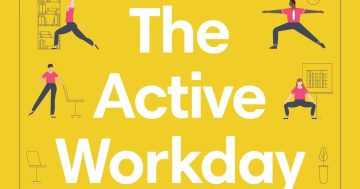Jamie Ducharme* says sitting has been labelled ‘the new smoking’ and standing too long is also bad for your health, so what should you do at the office?
 Sitting has been dubbed “the new smoking” due to the ever-accumulating body of research linking our sedentary lifestyles to everything from poor metabolic health to an increased risk of heart disease.
Sitting has been dubbed “the new smoking” due to the ever-accumulating body of research linking our sedentary lifestyles to everything from poor metabolic health to an increased risk of heart disease.
And earlier this month, a small new study published in the journal PLOS ONE added to that chorus, suggesting that too much sitting may over time contribute to memory loss and cognitive decline.
The study looked at 35 adults between the ages of 45 and 75.
Researchers took brain scans to measure the thickness of each person’s medial temporal lobe (MTL) — a part of the brain crucial to memory — and quizzed each person about how much time per day they spend sitting and moving around.
While it wasn’t possible to identify a clear cause-and-effect relationship, the researchers did find that increased sedentary time was associated with decreased MTL volume, suggesting that excessive sitting may be a risk factor for cognitive decline.
Based on findings like those, you couldn’t be blamed for swearing off your desk chair.
But that decision grows more complicated when you consider studies like one published in February in the journal Ergonomics, which says long bouts on your feet may not be so healthy, either.
Standing for a two-hour chunk during the work day, that study found, may lead to physical discomfort all over the body, and make it harder to stay focused and energised.
So if it’s not great to sit or stand all day, what should you do at the office?
Dr Richard Isaacson, Director of the Alzheimer’s Prevention Clinic at NewYork-Presbyterian/Weill Cornell Medical Center, says there’s no one-size-fits-all solution.
“An individual person needs to make a decision based on what’s best for them,” Isaacson says, adding factors including physical fitness, orthopedic issues, pregnancy and body weight could all make someone more or less suited to standing at work.
The best way to make a choice for yourself, he says, is to consult your doctor.
That said, Isaacson says the bulk of scientific evidence supports the notion that we should minimise time spent sitting.
“There’s way more evidence, and I would say stronger evidence, that suggests when someone sits for eight hours a day, it’s not good for you,” he says.
“It’s not good for the metabolic health, it’s not good for longevity.”
Switching to a standing desk may not be a cure-all — moving throughout the day, eating well, and exercising regularly are also important for brain and body health.
But Isaacson says using one for at least part of the day may help, adding that he regularly advises patients in his Alzheimer’s Prevention Clinic to do so.
(He does recommend wearing supportive shoes and standing on a soft mat, to reduce strain on the back and joints.)
If standing at the office really doesn’t work for you, however, Isaacson says there may be happy medium, so long as you have a baseline level of physical fitness: sitting on a balance ball, which at least activates the core and keeps your metabolism firing throughout the day.
* Jamie Ducharme writes for TIME and Fortune Magazine in New York. She tweets at @Jamie_Ducharme.
This article first appeared at fortune.com.











